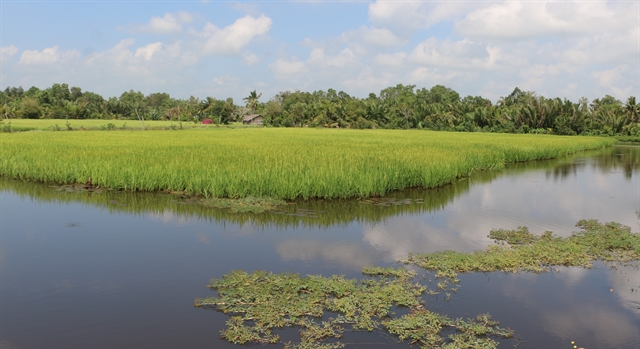 Society
Society

The Cửu Long (Mekong) Delta province of Bạc Liêu is expanding the use of organic fertilisers in rice cultivation to improve farmer’s incomes and protect the environment.

|
| Shrimp-rice fields grown to organic standards in Bạc Liêu Province. — VNA/VNS Photo Tuấn Kiệt |
BẠC LIÊU — The Cửu Long (Mekong) Delta province of Bạc Liêu is expanding the use of organic fertilisers in rice cultivation to improve farmer’s incomes and protect the environment.
In the last winter-spring rice crop, the Phước Long District Bureau of Agriculture and Rural Development launched a pilot programme for increasing the use of organic fertilisers and reducing the use of chemicals on a total area of 110ha, with 60 farmers involved.
Phạm Văn Cầu, one of the farmers, said: “The prices of inputs, especially fertilisers, have shot up, and so the use of organic fertilisers helps farmers reduce costs while rice plants still have high yields and quality.”
He grew 2ha of Đài Thơm 8, a speciality rice variety, and got nearly 10 tonnes per hectare, and earned more than VNĐ300 million (US$13,000), he said.
Organic fertilisers cost less than chemical fertilisers, and farmers in fact can make them themselves from animal waste, leaves and other agricultural by-products.
Thái Thị Loan, deputy head of the bureau, said organic fertilisers improve soil quality and help rice plants grow well and prevent diseases.
The pilot programme helped reduce the use of chemical fertiliser by 50-70 per cent, she said.
The bureau plans to expand the organic rice cultivation, she added.
In the last winter-spring rice, the province Agriculture Extension Centre implemented organic rice farming models on a total of 300ha in Phước Long, Hòa Bình and Vĩnh Lợi districts.
Farmers who took part in them were given free seeds and biological pesticides, and taught advanced farming techniques.
Huỳnh Quốc Khởi, director of the centre, said the models reduced costs by 10-20 per cent while yields were still high and farmers got higher prices for their clean rice.
Bạc Liêu has great advantages in adopting to organic standards since it has more than 40,000ha of lands where rice is grown in the rainy season and shrimp is bred at other times.
This model is naturally clean with farmers required to use few chemicals.
Local authorities encourage farmers to join co-operatives and tie up with companies to implement the model to ensure they can sell their produce and also grow high-quality rice for export.
Ba Đình Co-operative in Hồng Dân District was one of the first co-operatives to grow rice to organic standards, and its members now have 300ha under shrimp-rice.
In the last winter-spring rice crop, they planted ST24 and ST25 rice varieties, which have won awards as the world’s best.
Nông Văn Thạch, director of the co-operative, said: “All the rice was planted to organic standards.”
The co-operative guarantees outlets for all members’ produce, buying the rice at 15-20 per cent above market prices and selling it to HCM City, he said.
Bạc Liêu has established the Fragrant Rice - Clean Shrimp Co-operative Alliance with the participation of 21 co-operatives which have more than 4,000ha under shrimp-rice.
The co-operatives have created favourable conditions for establishing value chains for their products. — VNS




